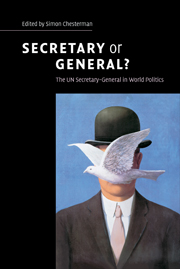Book contents
- Frontmatter
- Contents
- Contributors
- Foreword
- Acknowledgements
- Introduction: secretary or general?
- PART I Defining and refining the job description
- 1 The evolution of the Secretary-General
- 2 “The most impossible job” description
- 3 Selecting the world's diplomat
- PART II Maintaining peace and security
- PART III Normative and political dilemmas
- PART IV Independence and the future
- APPENDIX: selected documents on the Secretary-General
- Select bibliography
- Index
3 - Selecting the world's diplomat
Published online by Cambridge University Press: 06 January 2010
- Frontmatter
- Contents
- Contributors
- Foreword
- Acknowledgements
- Introduction: secretary or general?
- PART I Defining and refining the job description
- 1 The evolution of the Secretary-General
- 2 “The most impossible job” description
- 3 Selecting the world's diplomat
- PART II Maintaining peace and security
- PART III Normative and political dilemmas
- PART IV Independence and the future
- APPENDIX: selected documents on the Secretary-General
- Select bibliography
- Index
Summary
The selection of the eighth Secretary-General of the United Nations was probably the most important decision for the future of the United Nations to be made in 2006. It came at a time of growing public criticism about the lack of transparency in the appointment process and emerging tension between the General Assembly and the Security Council about their respective roles in the process. Given the importance of the issue, it is surprising that the process for making the appointment was so neglected during the UN reform discussions in 2005.
Until February 2006, both inside and outside the United Nations, gossip and analysis seemed to focus on possible personalities for a new Secretary-General, great power preferences, and the politics of regional rotation. Wider institutional issues – such as the role of the General Assembly in the appointment, the impact of the selection issue on the growing debate about Security Council legitimacy, and the relevance of General Assembly decisions taken as recently as 1997 – seemed to be forgotten or lost in the diplomatic haze.
The history to date reveals four distinct phases. At the outset, in 1946, the General Assembly played a leading role in establishing the process for making the appointment. The second and longest phase was one of almost complete dominance of the process by the Security Council. The third phase came in the period 1996–1997, when the General Assembly – concerned about revitalization of its role in general and reflecting in particular the divisions caused by the veto of Boutros-Ghali's bid for reappointment – took a number of decisions designed to influence the process for appointing Kofi Annan's successor.
- Type
- Chapter
- Information
- Secretary or General?The UN Secretary-General in World Politics, pp. 47 - 66Publisher: Cambridge University PressPrint publication year: 2007
- 2
- Cited by



